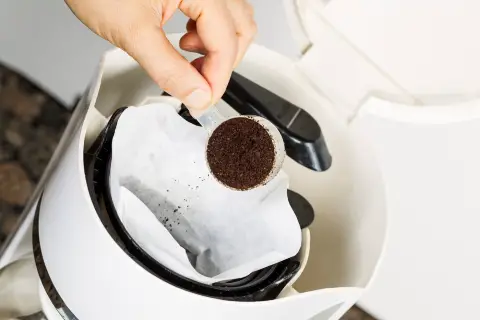If you’re just about to brew a fresh carafe of coffee but need it stronger than usual, there are many ways to strengthen it. One of the first ways that would probably come to mind is by adding more coffee grounds to it. But does adding more coffee grounds make coffee stronger? In short, yes it certainly will. But getting stronger coffee is mostly dependent on your coffee-to-water ratio as per your brewing method. Too little coffee in the water will give you weak, watery coffee, and too much will give you equally bad or worse-tasting coffee.
In this article, we’ll be getting into the various factors that determine the strength of coffee and try to understand what exactly “strong coffee” means.
Table of Contents
- 1 What is Strong Coffee?
- 2 Does Adding More Coffee Grounds Make Coffee Stronger?
- 3 Does Adding More Coffee Grounds Increase Caffeine?
- 4 Which Coffee Is Stronger – Light Or Dark Roast?
- 5 Do Finer Coffee Grounds Make Stronger Coffee?
- 6 How Much Coffee Grounds For Strong Coffee?
- 7 Factors that Determine the Strength of Coffee
- 8 How To Make Strong Coffee In A Coffee Maker
What is Strong Coffee?
“Strong coffee” is very often used to describe both bitter-tasting and highly caffeinated coffee. However, it is also used by some to describe coffee that is thicker (more body) and much more flavorful than regular coffee. Others view strong coffee as highly concentrated coffee. While this term has many definitions, they are all describing a beverage made with a high extraction of coffee.
Baristas and coffee shops generally understand “strong coffee” to mean whatever the majority of customers believe it to be. Ultimately, it’s a way to describe a greater strength of coffee flavor and extraction in a coffee beverage. It is regarded as incorrect to use it as a negative attribute when describing bad or very bitter coffee. Bitter coffee can be attributed to multiple stages in the coffee-making process right down to the freshness of the beans, whereas, getting strong coffee depends only on 4 factors that we’ll be covering ahead.
Does Adding More Coffee Grounds Make Coffee Stronger?
Sure, you can increase the strength of your coffee by adding extra grounds. The quantity of coffee used and the duration of brewing time affect the strength of the coffee.
Caffeine and other substances are extracted from coffee grinds during the brewing process. A stronger, more powerful taste is produced when more coffee grinds are used because more caffeine and other components are extracted.
However, there is a maximum amount that may be added before the flavor turns excessively acidic or harsh. Depending on preferences, it is advised to use a ratio of 1 to 2 tablespoons of coffee grounds per 6 ounces of water.
It is crucial to remember that the kind of coffee bean and the degree of roasting may both impact the intensity and flavor of the beverage. For instance, compared to light roast coffee beans, dark roast coffee beans often have a richer, more powerful flavor. So rather than adding too much coffee to your coffee maker, try buying a darker roast next time. Or if you roast your beans at home, roast them a little longer before you let the beans rest for degassing.
To summarize, increasing the amount of coffee grounds can make coffee stronger, but finding the ideal balance is crucial to obtaining the optimum flavor without over-extracting the coffee.
Does Adding More Coffee Grounds Increase Caffeine?
Adding more coffee grounds will not increase the amount of caffeine in your coffee to a great degree. However, It will certainly increase the flavor and will simultaneously increase the bitter alkaloids in the coffee. So, by adding more and more grounds, you may be increasing the caffeine content only slightly while ruining the taste of the coffee. There are far more efficient and proven ways to get more caffeine in your coffee.
If you’re needing caffeine more than a body of flavor in your cup, then you would need to go back a few steps, to the roasting process. Dark roasts contain less caffeine because the longer roasting process gets rid of some amounts of it. Therefore, a light roast bag of coffee beans should be your go to if you need a high dose of caffeine per cup of coffee. Just remember that you can expect a lighter flavor than you would get from a dark roast.
You can also try lengthening the brewing time a little to extract more caffeine from the same amount of beans.
Which Coffee Is Stronger – Light Or Dark Roast?
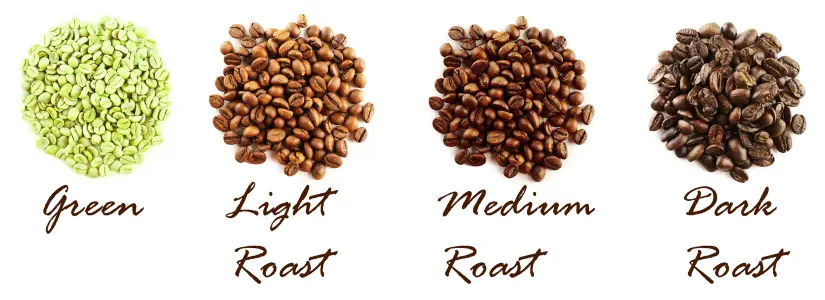
When it comes to coffee strength, having a rich, full-bodied flavor is separate from having a high content of caffeine. Darker roasts have a much stronger, bolder flavor profile than lighter roasts. But this is not at all an indicator of high caffeine content. Lighter roasts actually have a much higher content of caffeine, while darker roasts are stronger in taste and flavor.
The higher caffeine content in lighter roasts is due to the reduced roasting time of the beans before they’re ground, as compared to a dark roast which has much of its caffeine burnt off during the roasting process. In the end, it’s up to you to decide what type of coffee strength you want more of in your brew – stronger taste or higher caffeine.
However, the roasting process isn’t the only determining factor when it comes to the overall strength of the end product.
Do Finer Coffee Grounds Make Stronger Coffee?
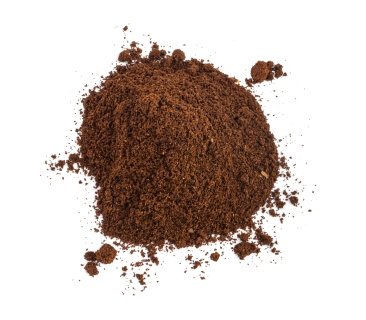
The grind size is as much of a determining factor in coffee strength as the brewing time. The finer you grind coffee beans, the more surface area there is for water to be in contact with. Since fine grounds are more densely packed, extraction time slows down as the water trickles through. Because the water is in contact with the grounds for a longer time, you’ll get a stronger-tasting coffee. A greater amount of caffeine will be extracted as well.
But, to achieve such an extraction, the brewing time must also be just right. If you brew for too long, you could end up with overpowering flavors and bitterness, and for too short a time, the coffee flavor may still be present but the caffeine extraction will be much weaker.
Also note that because fine ground coffee is more densely packed, a spoon of the grounds actually contains more coffee per volume than if the spoon is holding coarsely ground coffee.
How Much Coffee Grounds For Strong Coffee?
When making strong coffee, the coffee-to-water ratio is highly important to get right. While there are different coffee-to-water ratios for every type of coffee beverage, the strength of a cup of coffee is ultimately dependent on your preference. A standard ratio for regular brewed coffee (drip coffee) is 6 ounces of water for every 1 tablespoon of coffee. This will yield coffee that is neither too strong nor too weak. This is a good place to start if you are trying to figure out how strong you like your coffee.
If this ratio is too weak or you’re getting watery coffee, simply increase the amount of grounds added to the same amount of water. 2 tablespoons of coffee in 6 ounces of water is generally the suggested proportion for brewing strong coffee, although that can be tweaked as you prefer. Adding too much grounds will have bad effects on the coffee, depending on the brewing time. Always remember, though adding more grounds will increase the strength of your coffee, it won’t be nearly as effective if the grounds aren’t fine enough and the roast isn’t as you like it.
Factors that Determine the Strength of Coffee
To help you get the exact level of strength you want in a cup of coffee, here are the 4 most important factors that will affect the strength of your coffee.
Coffee to Water Ratio
Getting the perfect amount of extraction of the right compounds from the coffee grounds is crucial to a good cup of coffee. It is easy to over-extract and get bitter coffee, or under-extract and get weak coffee with sour notes. A great cup of coffee should have a proper body of flavor, not be too bitter, and should have the right amount of caffeine content. For the latter, if you’re trying to fix a weak cup of coffee by adding more grounds, it won’t help.
This is why there is a standard coffee-to-water ratio for every brewing method of coffee. The standard ratio for your choice of brewing method will give you a good idea of what that brew should taste like, and as per your liking, you can then choose to alter the ratio if you prefer your coffee stronger or weaker. It’s always a good idea to use a measuring utensil or cup to add the right amount of coffee to the water. You may find that you only need a tablespoon of coffee if you’re using fine grounds, where 2 tablespoons of course grounds for a cup is more suitable for strong coffee.
Temperature of Water
The perfect water temperature for brewing is a near-boiling point, as it becomes a better solvent. The ideal temperature is 195-205 degrees Fahrenheit. If the water is cooler than this, the brewing time will not be sufficient for the right amount of extraction. Any hotter, and the coffee could be over-extracted.
Since it may be difficult to get this particular temperature every time, it is recommended to brew coffee on an automatic drip machine that’s built to get water up to the ideal temperature for a perfect brew. For pour over or French Press, use an electric kettle with settings for temperature control. We also have some solutions for you if you want to keep your brewed French Press coffee hot for a bit longer.
Water Contact Time
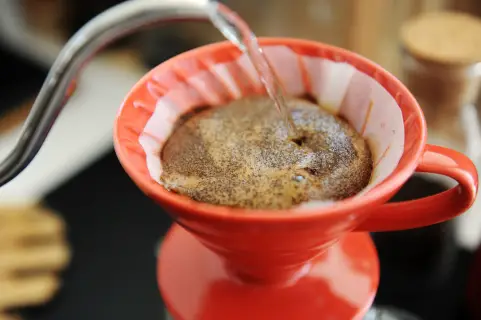
The contact time between the grounds and the water is very important, as this determines the overall extraction of flavor and other compounds from the grounds. As with the other processes, the contact time is also different from one brew to the next. The finer the grounds are, the shorter time they will need to be in contact with the water. Contact time can go from less than one minute for a brew like an espresso, to 16 hours for a cold brew (very coarse grounds). If you get the contact time wrong, then it will lead to either under-extracted weak coffee or over-extracted strong coffee.
Strength of the Roast
Dark roasted coffee beans will result in a stronger and more robust flavor profile but your brew will be lower in caffeine. Light roasted beans will result in a lighter flavor but will give you a higher caffeinated brew. If you want a balance between flavor and caffeine, choose a medium roast.
Amount of Coffee Grinds
How do you like your coffee? How much coffee are you planning to make? The amount of grounds you add will affect the taste but not as much as the factors above. The coffee-to-water ratio comes to greater use here when you don’t want to overdo it with the grounds. Once you have an idea of how much water will be used for your brew, a proper measurement of coffee grounds will also be clear.
How To Make Strong Coffee In A Coffee Maker
Though we already broke down multiple factors that determine strong coffee, how do you make coffee strong in a coffee maker if you already have your preferred size of grind and level of roast? Here are a few suggestions you could follow if you want that above-average strength and aroma in your coffee.
Clean Your Coffee Filter
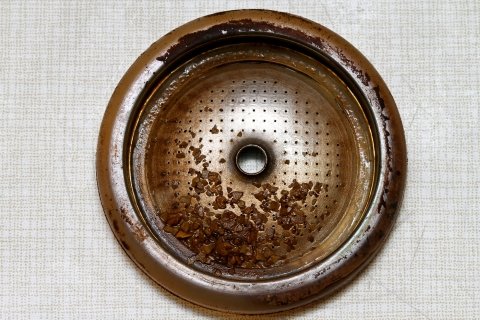
Using a freshly cleaned coffee filter or a new disposable one will give you the right strong flavor you’d want in a coffee, without any bitterness. The bitterness will be present to a great degree only if your filter has any leftover coffee grounds. Make this a habit along with regular cleaning of your coffee maker as a whole.
Only Use Fresh Coffee
If you want a coffee with great body and aroma, using fresh grounds is the way to go. It’s easy to measure fresh grounds for your preferred amount of strength, and if you grind at home, make sure the grounds are as consistent as possible for even extraction while brewing. If you go with using instant coffee, you’ll find yourself adding way more than necessary to get good strength in your cup while unknowingly increasing the caffeine content. This will also yield poor taste as compared to coffee made with fresh grounds.
Pick the Right Coffee
The next time you brew a carafe of coffee, try investing in Robusta coffee beans for a much stronger coffee than most. Robusta is characterized by its strong deep flavor along with a higher caffeine content than other types of coffee including Arabica.
Use A Higher Number of Tablespoons of Coffee Than Usual
If you’re in the mood for a strong, concentrated cup of coffee, you can readjust your coffee-to-water ratio by increasing the number of tablespoons of coffee while keeping the water at the same level. Of course, a few tests would need to be conducted before you land on your preferred strength of coffee.
Double Brew Technique
This is a commonly used, simple technique to increase the strength of your coffee. You take the normal amount of grounds and brew a cup of coffee as normal and then once that’s done you immediately remove the old grounds and replace the filter with the same amount of fresh grounds. You then take the warm freshly brewed cup of coffee and pour that over the new coffee grounds so that you get an extra strong cup of coffee the second time. Be aware, however, that this method of brewing will result in double the amount of caffeine too!
For now, we hope you’ve gained enough information on how to make stronger coffee, and how to prevent your coffee from becoming weak. Happy brewing!

